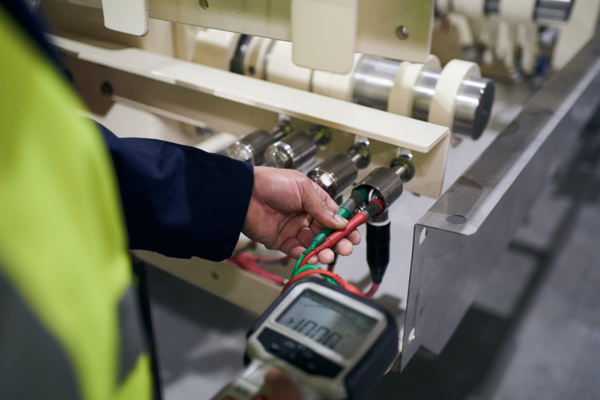As an employer, the safety and security of your business’ premises must be an area of utmost importance. Fixed Wire Testing on electrical installations is an essential part of this, as all electrical equipment over time deteriorates from wear and tear, corrosion, excessive electrical loads, aging and environmental influences. Attention to detail and compliance with safety guidelines is vital.
In this blog, Woodward Group discusses Fixed Wire Testing, its importance and the risks of not having regular inspections.
What is Fixed Wire Testing?
Fixed Wire Testing, also known as Periodic Inspection or Electrical Installation Condition Report (EICR), involves the inspection and testing of all electrical installations in a building to ensure you are safe and compliant with regulations.
 A Fixed Wire Test must be conducted by a professional, qualified engineer to ensure full compliance. The engineer will visually check all relevant areas of the premises, such as mains panels, distribution boards, light fittings, electrical accessories and mechanical power supplies. All circuits, cabling and equipment will also be physically tested and readings recorded within the report.
A Fixed Wire Test must be conducted by a professional, qualified engineer to ensure full compliance. The engineer will visually check all relevant areas of the premises, such as mains panels, distribution boards, light fittings, electrical accessories and mechanical power supplies. All circuits, cabling and equipment will also be physically tested and readings recorded within the report.
Once the engineer is complete onsite an electrical installation conditioning report is submitted detailing non-compliance works and these will be broken down into categories of severity. C1 & C2 defects will result in an unsatisfactory certification whereas C3 defects shown non compliance but still a satisfactory certification.
Potential risks of not having regular inspections
As electrical installations deteriorate with age, regular testing and inspections are essential to detect and prevent electrical faults and hazards – and can have lifesaving results.
In additional to legal consequences, not getting your premises tested could result in an increased risk of accidents. An electrical fault could lead to potentially fatal accidents, as they can cause electrical fires, electric shocks or even explosions. Any individual within the building could be at risk if regular inspections have not occurred and electrics are not up to standard, along with equipment that could be damaged as well as the building itself.
Reputational damage can also occur if regular inspections have not taken place and there has been negative media coverage of an accident caused by non-compliance. Damage to a company’s reputation can take a long time to recover from and will ultimately lead to a loss of customers, revenue and credibility.
The risks of not getting a premises electrically tested are significant and greatly outweigh any benefits that may occur from cutting corners.
Legal requirements for businesses
Fixed Wire Testing is a legal requirement under BS7671:2018 and should be prioritised by all managers and owners of commercial premises with public access. Typically, these tests must be carried out every five years, however some more high-risk properties such as industrial units and spa hotels require three-yearly inspections or even one-yearly inspection for medical buildings, swimming pools etc.
 Failure to conduct Fixed Wire Testing in accordance with BS7671 results in non-compliance with the Health & Safety at Work Act (often called the HSE Act) and Electricity at Work Regulations. Breaches of these regulations can result in fines or even imprisonment depending on the severity of the incident and the harm inflicted.
Failure to conduct Fixed Wire Testing in accordance with BS7671 results in non-compliance with the Health & Safety at Work Act (often called the HSE Act) and Electricity at Work Regulations. Breaches of these regulations can result in fines or even imprisonment depending on the severity of the incident and the harm inflicted.
Carrying out Fixed Wire Testing not only demonstrates that you are compliant with numerous health and safety regulations but, of increasing importance, it ensures you are compliant with the requirements of most commercial insurers.
How we can help
Woodward Group’s Compliance division ensures our clients receive every inspection needed in order to carry out business operations in a safe environment. As an NICEIC approved contractor, with CHAS and Construction Line accreditations, every job we undertake is carried out in accordance with The Electricity at Work Regulations.
We provide a bespoke solution for every client, and we always strive to carry out testing with minimal disruption to your business operations.


